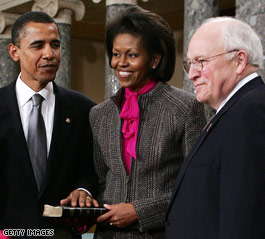Louis-Farrakhaning Obama Part II

(with his "pro-Israeli" cousin "Dick")
Last month I predicted that Hillary and Company would end-up trying to "Louis-Farrakhaning" Obama, especially by raising doubts about his commitment to Israel. And...fastforward to the new issue of Newsweek where "Good for the Jews"points out that "Hillary Clinton's surrogates are questioning Obama's commitment to U.S.-Israel relations." I guess that some things are inevitable.
And this:
Business Times - 26 Feb 2008
Change US foreign policy dramatically? No, They Can't
By LEON HADAR
WASHINGTON CORRESPONDENT
I HAVE been receiving a lot of emails from friends from around the world who may have been following the US presidential primaries races with more intensity than some of my colleagues in Washington. Most of the inquiries were about how each presidential candidate would act as US president towards the inquirer's own country and/ or geographical region. It might surprise my email correspondent from Albania, for example, to learn that the US relationship with his country has not been raised even once in campaign so far. In fact, my guess is that even the recent decision by Kosovo, the ex-province of Serbia, to declare its independence - a move that has raised tensions between the West and Russia - won't be discussed.
The only foreign policy issue that keeps popping up from time to time during the campaign is the war in Iraq. Barack Obama has pointed out that Hillary Clinton had voted in the Senate in favour of giving President Bush the authority to go to war against Iraq. Meanwhile, John McCain blasts his two Democratic rivals for wanting to 'cut and run' out of Iraq. The allegations that Teheran was pursuing a nuclear military programme and the possibility that the US could attack Iran has also received very little attention. And, yes, China had been mentioned in the campaign, but usually as a target for populist-style scapegoating by the Democratic candidates, who depict that country as the source of many of America's economic ills.
One of the reasons that foreign policy issues have rarely been at the centre of presidential campaigns is that most American voters recognise that any elected president will always be constrained in his or her ability to influence the world by external and domestic pressures, including the powerful Congress and media and the many interest groups that operate in Washington.
Recall the way presidential candidate Bill Clinton bashed then president George HW Bush for 'coddling' the 'tyrants' in Beijing, and then, how President Clinton ended up promoting a normalised trade relationship with the Chinese as well as China's accession to the World Trade Organization (WTO).
Hence, it's not inconceivable that notwithstanding all their China- bashing rhetoric during the campaign, a President (Hillary) Clinton or President Obama will have no choice but to continue engaging the Chinese whose surpluses, after all, have helped finance the US current account deficit as well as bail out troubled US financial institutions. Not to mention that some of these same financial institutions - as well as high-tech firms in Silicon Valley that do business in China - are helping to fund the campaigns of these two Democratic presidential candidates.
So expect either a President Obama or President Hillary Clinton to continue denouncing some of China's human rights conduct - a topic that excites human rights groups with ties to the Democrats - while expanding economic ties with that country.
Similarly, don't pay too much attention to Mr McCain's tough-guy nationalist oratory as he tries to depict the Democrats as weak on national defence or as 'appeasers'. Contrary to the concerns expressed by some of my email correspondents, a President McCain will not attack Iran a day after entering office. Nor will he adopt a more confrontational approach towards the Chinese. And don't be surprised if after a 'decent interval', President McCain will begin taking steps to withdraw US troops from Iraq and start some sort of detente with the Iranians.
Indeed, reality in the form of an overstretched US military and expanding budget deficits will tend to bite even the most hawkish White House occupant. Don't forget that two of Mr McCain's top foreign policy advisers are Brent Scowcroft and Henry Kissinger, two Republican realpolitik types who have been sceptical about the American misadventure in Iraq and who are enthusiastic supporters of US engagement with the Chinese. And remember too that those China-oriented hedge funds, high-tech firms and other corporate entities are powerful political players in the pro-business Republican Party.
Finally, I'm sorry to disappoint some of the 'Obamaniacs' among my email correspondents. No, neither a President Obama nor President Hillary Clinton will start withdrawing US troops from Iraq a day after entering office. In general, one shouldn't expect a dramatic transformation in US foreign policy. There will probably be some changes in style and management which will help improve the US global position. But the reality of American power and interests, including its need for access to energy resources worldwide and its commitment to governments in the Middle East, is not going to change overnight - and interest groups in Washington will make sure that they don't.
This will force a President Obama, Hillary Clinton or McCain to make only small and gradual modifications in US policy in Iraq - or anywhere else.
Copyright © 2007 Singapore Press Holdings Ltd. All rights reserved.
Comments